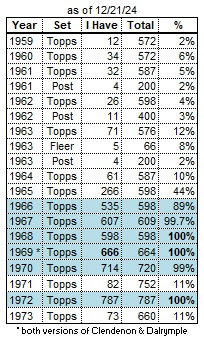Long-time Phillie Curt Simmons (#39) leads off the parade. (I think he wins the contest for most surface area!) This is Curt's last baseball card, as he closed out a fine career in 1967 with the Cubs and Angels, one year after his contemporary Robin Roberts ended his MLB career (although Roberts pitched for the AA Reading Phillies in 1967). Curt is one of only 3 players with 1967 cards to have his MLB debut in the 1940s (along with Smoky Burgess and Joe Nuxhall).
.JPG)
.JPG)
Next up is Danny Cater (#157) , also an ex-Phillie. After spending 6 years in the Phillies' minor league system, followed by 1 year in Philadelphia, Cater was traded to the White Sox. Here we see him in his Sox jersey, with just enough overhead clearance for his name.
.JPG)
.JPG)
Contestant number three is Eddie Fisher (#434) (no, not that Eddie Fisher!). Eddie looks like he also just escaped from the Chicago White Sox. He lucked out, and went to the world champion Orioles, whereas Cater went to "the Yankees farm team" in Kansas City.
.JPG)
.JPG)
Of course, no discussion on crew cuts is complete without the king:

.jpg)
.jpg)
.jpg)
.jpg)
.jpg)
.jpg)
.jpg)
.JPG)

.jpg)


.jpg)
.jpg)
.jpg)


















